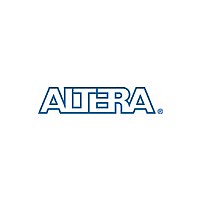EP2AGX95EF29C4N Altera, EP2AGX95EF29C4N Datasheet - Page 156

EP2AGX95EF29C4N
Manufacturer Part Number
EP2AGX95EF29C4N
Description
IC ARRIA II GX FPGA 95K 780FBGA
Manufacturer
Altera
Series
Arria II GXr
Datasheets
1.EP2AGX45CU17C6N.pdf
(96 pages)
2.EP2AGX45CU17C6N.pdf
(14 pages)
3.EP2AGX45CU17C6N.pdf
(692 pages)
4.EP2AGX45CU17C6N.pdf
(10 pages)
5.EP2AGX45CU17C6N.pdf
(88 pages)
6.EP2AGX95EF29C4N.pdf
(306 pages)
Specifications of EP2AGX95EF29C4N
Number Of Logic Elements/cells
89178
Number Of Labs/clbs
3747
Total Ram Bits
6679
Number Of I /o
372
Voltage - Supply
0.87 V ~ 0.93 V
Mounting Type
Surface Mount
Operating Temperature
0°C ~ 85°C
Package / Case
780-FBGA
Family Name
Arria® II GX
Number Of Logic Blocks/elements
93674
# I/os (max)
372
Frequency (max)
500MHz
Operating Supply Voltage (typ)
900mV
Logic Cells
93674
Ram Bits
7025459.2
Operating Supply Voltage (min)
0.87V
Operating Supply Voltage (max)
0.93V
Operating Temp Range
0C to 85C
Operating Temperature Classification
Commercial
Mounting
Surface Mount
Pin Count
780
Package Type
FC-FBGA
Lead Free Status / RoHS Status
Lead free / RoHS Compliant
Number Of Gates
-
Lead Free Status / Rohs Status
Compliant
Available stocks
Company
Part Number
Manufacturer
Quantity
Price
Part Number:
EP2AGX95EF29C4N
Manufacturer:
ALTERA/阿尔特拉
Quantity:
20 000
- EP2AGX45CU17C6N PDF datasheet
- EP2AGX45CU17C6N PDF datasheet #2
- EP2AGX45CU17C6N PDF datasheet #3
- EP2AGX45CU17C6N PDF datasheet #4
- EP2AGX45CU17C6N PDF datasheet #5
- EP2AGX95EF29C4N PDF datasheet #6
- Current page: 156 of 306
- Download datasheet (7Mb)
6–22
I/O Bank Restrictions
Arria II GX Device Handbook, Volume 1
f
Arria II GX R
optimizing OCT for use in typical transmission line environments, the R
must be equal to or less than the transmission line impedance for optimal
performance. In ideal applications, setting the OCT impedance to match the
transmission line impedance avoids reflections. Alternatively, you can use external
pull-up resistors to terminate the voltage-referenced I/O standards such as SSTL and
HSTL.
Differential I/O Standards
Differential I/O standards typically require a termination resistor between the two
signals at the receiver. The termination resistor must match the differential load
impedance of the signal line. Arria II GX devices provide an optional differential
on-chip resistor when you use LVDS.
For PCB layout guidelines, refer to
AN 315: Guidelines for Designing High Speed FPGA
Each I/O bank can simultaneously support multiple I/O standards. The following
sections provide guidelines for mixing non-voltage-referenced and voltage-referenced
I/O standards in Arria II GX devices.
Non-Voltage-Referenced Standards
Each Arria II GX device I/O bank has its own VCCIO pins and supports only one
V
any number of input signals with different I/O standard assignments, as shown in
Table 6–1 on page
For output signals, a single I/O bank supports non-voltage-referenced output signals
that drive at the same voltage as V
value, it can only drive out the value for non-voltage-referenced signals. For example,
an I/O bank with a 2.5-V V
and 3.0-V LVCMOS inputs (but not output or bidirectional pins).
Voltage-Referenced Standards
To accommodate voltage-referenced I/O standards, each user I/O bank of the
Arria II GX device has a dedicated VREF pin. Each bank can only have a single V
voltage level and a single V
An I/O bank featuring single-ended or differential standards can support
voltage-referenced standards as long as all voltage-referenced standards use the same
V
Voltage-referenced bidirectional and output signals must be the same as the V
voltage of the I/O bank. For example, you can only place SSTL-2 output pins in an
I/O bank with a 2.5-V V
CCIO
REF
setting.
, either 1.2, 1.5, 1.8, 2.5, 3.0, or 3.3 V. An I/O bank can simultaneously support
S
OCT provides the convenience of no external components. When
6–2.
CCIO
CCIO
REF
.
voltage level at a given time.
setting can support 2.5-V standard inputs and outputs
CCIO
AN 224: High-Speed Board Layout Guidelines
. Because an I/O bank can only have one V
PCBs.
Chapter 6: I/O Features in Arria II GX Devices
Arria II GX Design Considerations
© July 2010 Altera Corporation
S
impedance
CCIO
and
CCIO
CCIO
Related parts for EP2AGX95EF29C4N
Image
Part Number
Description
Manufacturer
Datasheet
Request
R

Part Number:
Description:
CYCLONE II STARTER KIT EP2C20N
Manufacturer:
Altera
Datasheet:

Part Number:
Description:
CPLD, EP610 Family, ECMOS Process, 300 Gates, 16 Macro Cells, 16 Reg., 16 User I/Os, 5V Supply, 35 Speed Grade, 24DIP
Manufacturer:
Altera Corporation
Datasheet:

Part Number:
Description:
CPLD, EP610 Family, ECMOS Process, 300 Gates, 16 Macro Cells, 16 Reg., 16 User I/Os, 5V Supply, 15 Speed Grade, 24DIP
Manufacturer:
Altera Corporation
Datasheet:

Part Number:
Description:
Manufacturer:
Altera Corporation
Datasheet:

Part Number:
Description:
CPLD, EP610 Family, ECMOS Process, 300 Gates, 16 Macro Cells, 16 Reg., 16 User I/Os, 5V Supply, 30 Speed Grade, 24DIP
Manufacturer:
Altera Corporation
Datasheet:

Part Number:
Description:
High-performance, low-power erasable programmable logic devices with 8 macrocells, 10ns
Manufacturer:
Altera Corporation
Datasheet:

Part Number:
Description:
High-performance, low-power erasable programmable logic devices with 8 macrocells, 7ns
Manufacturer:
Altera Corporation
Datasheet:

Part Number:
Description:
Classic EPLD
Manufacturer:
Altera Corporation
Datasheet:

Part Number:
Description:
High-performance, low-power erasable programmable logic devices with 8 macrocells, 10ns
Manufacturer:
Altera Corporation
Datasheet:

Part Number:
Description:
Manufacturer:
Altera Corporation
Datasheet:

Part Number:
Description:
Manufacturer:
Altera Corporation
Datasheet:

Part Number:
Description:
Manufacturer:
Altera Corporation
Datasheet:

Part Number:
Description:
CPLD, EP610 Family, ECMOS Process, 300 Gates, 16 Macro Cells, 16 Reg., 16 User I/Os, 5V Supply, 25 Speed Grade, 24DIP
Manufacturer:
Altera Corporation
Datasheet:












